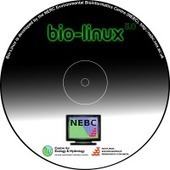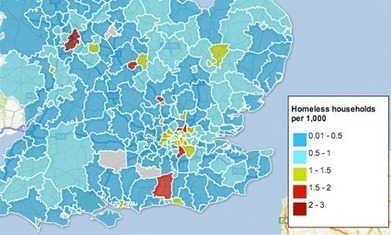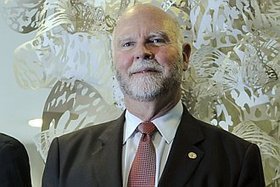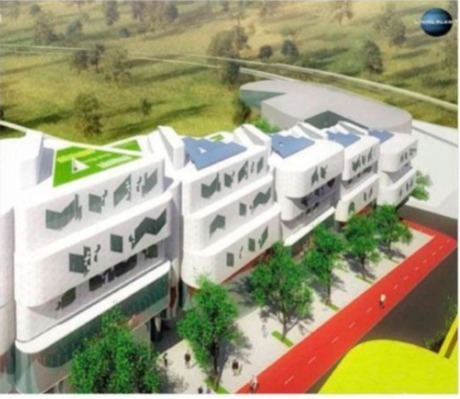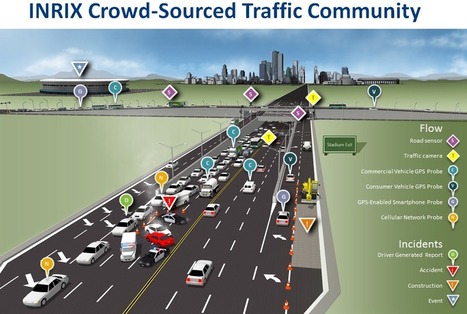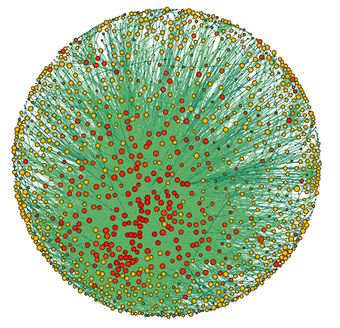 Your new post is loading...
 Your new post is loading...

|
Rescooped by
Phillip Trotter
from BS2040: Bioinformatics
April 26, 2012 4:15 PM
|
Bio-Linux is an operating system set up for bioinformatics with a vast number of programs pre-installed. It can be obtained for free from the NERC Environmental Bioinformatics Centre. You can obtain a USB drive from NERC and boot from that ...
Via Dr Richard Badge

|
Scooped by
Phillip Trotter
April 26, 2012 2:41 AM
|
Just starting out in visualising your data? Looking for something simple to use? Good quick guide to available tools from Simon Rogers and co at the Guardian
Avoid the hype and get a solid basic understanding behind Big data in this brief article from business week.
Via Gerd Moe-Behrens

|
Scooped by
Phillip Trotter
April 26, 2012 2:16 AM
|
John Liechty writes in a column on the Nature website, "Everyone would benefit if bankers were to engage with scientists to build the infrastructure needed to price system-wide risk. Banks could get feedback about common holdings and trading strategies, which would allow them to adjust their behaviour and avoid following the herd. Regulators would have extra market information to help them to determine when to act to ensure stability. And the rest of us could have increased confidence in the financial system."

|
Scooped by
Phillip Trotter
April 26, 2012 2:06 AM
|
Contacts between individuals serve as pathways where infections may propagate. These contact patterns can be represented by network structures. Static structures have been the common modeling paradigm but recent results suggest that temporal structures play different roles to regulate the spread of infections or infection-like dynamics. On temporal networks a vertex is active only at certain moments and inactive otherwise such that a contact is not continuously available. Learn more....

|
Scooped by
Phillip Trotter
April 26, 2012 1:06 AM
|
This one is important to us as we start testing OLAPX and BIOLAP approaches for data analysis. The Ewing Marion Kauffman Foundation, based in Kansas City, Missouri, aims to “create the world’s largest pool of openly available, user-contributed data about health and genomics” in hopes of easing challenges with informed consent and data ownership that some biomedical researchers say are holding science back in the era of ‘big data’. Learn more...

|
Scooped by
Phillip Trotter
April 26, 2012 1:00 AM
|
IBM acquires Vivisimo for big data. Vivisimo provide a means to federate search and rank search results across hadoop - providing a fast way to get a return on Hadoop investments. More info on Tim Powers' Smarter Analytics blog via a guest post from David Corrigan at IBM.

|
Scooped by
Phillip Trotter
April 26, 2012 12:51 AM
|
Brian Arthrur's earlier works' at the Santa Fe Institute helped establish complex systems thinking as a legitimate approach to economics. His new book "Increasing Returns and Path Dependence in the Economy (Economics, Cognition, and Society): W.Arthur" is now available

|
Scooped by
Phillip Trotter
April 25, 2012 5:29 AM
|
To a generation which grew up with computers, the field of synthetic biology - creating artificial life forms - is a story they can relate to, said American geneticist Craig Venter.

|
Scooped by
Phillip Trotter
April 25, 2012 5:04 AM
|
Updated item on Smart Cities : Urban Plan IT is developing a bank of PlaceApps for Urban OS, but the company plans to publish its API so everyone from partners like Microsoft to self-taught bedroom coders can try their hand at PlaceApp development and even sell their creations...

|
Scooped by
Phillip Trotter
April 25, 2012 4:56 AM
|
When you build traffic models and simulations of cities and economic development, you build a natural affinity to systems that use individual data contributions to define the big picture. INRIX does this for accurate traffic data and its awesome. See how it works...

|
Scooped by
Phillip Trotter
April 24, 2012 5:27 PM
|
Complex systems such as ecologies and economies have structural, architectural and behavioral characteristics in common. The stability of the financial system and the potential for systemic events to alter its function have long been critical issues for central bankers and researchers. this publichation by the US Academy of Sciences highlights how complex systems science helps us understand systemic risk.

|
Scooped by
Phillip Trotter
April 24, 2012 5:11 PM
|
Having worked with WorldBank to create and maintain data sets in the past - this is brilliant news. The WorldBank's "Open Development," portal now provides access to data, publications and research papers from World Bank projects and studies. Worth bookmarking.
|

|
Rescooped by
Phillip Trotter
from complexity matters
April 26, 2012 3:59 PM
|
Mike Batty at CASA - leads some of the UK's most pioneering R&D in advanced spatial systems. This is a must read if you are interested in complex systems and city development. Cities and Complexity: Understanding Cities with Cellular Automata, Agent-Based Models, and Fractals (9780262524797): Michael Batty: Books (Cities and Complexity: Understanding Cities with Cellular Automata, Agent-Based Models, and Frac...)...
Via Farshad Saadatmand

|
Scooped by
Phillip Trotter
April 26, 2012 2:27 AM
|
Good Overview of the field of synthetic biology.

|
Rescooped by
Phillip Trotter
from Social Simulation
April 26, 2012 2:18 AM
|
It sounds paradoxical, but today it appears that we understand more about the universe than our society...
Via Frédéric Amblard

|
Rescooped by
Phillip Trotter
from Social Simulation
April 26, 2012 2:07 AM
|
An IBM Global CEO Study conducted in 2010 concluded that complexity was the primary challenge emerging out of its conversations with 1,500 CEOs and senior government officials.
Via Frédéric Amblard

|
Scooped by
Phillip Trotter
April 26, 2012 1:23 AM
|
Today, Alan Turing is best known as the father of modern computer science, but in 1952 he sketched out a biological model in which two chemicals — an activator and an inhibitor — could interact to form the basis for everything from the color...

|
Scooped by
Phillip Trotter
April 26, 2012 1:02 AM
|
How do you build a major location aware asset management system in 10 months? GDF Suez Energy Romania, gave a fascinating overview of how GDF Suez did exactly that at the Geospatial World Forum in Amsterdam in a presentation by Radu Negoita, GIS Manager. Learn more...

|
Scooped by
Phillip Trotter
April 25, 2012 5:27 AM
|
8 years back one of the papers that blew my mind was J.W.Szostak et al's paper on the total synthesis of cellular mechanisms of a simple cell. This paper by Loakes and Holliger gives a great update on the fascinating field of synthetic biology.

|
Scooped by
Phillip Trotter
April 25, 2012 5:32 AM
|
We get asked about Big Data a lot. It is hyped and hot - But is there any substance to it or is it just a fancy rebranding of business intelligence. This overview artile from Mycustomer.com gives a great introduction

|
Scooped by
Phillip Trotter
April 25, 2012 5:19 AM
|
One for the commute reading pile: When RNA is replicated in cell-free systems, a ubiquitous problem is the hijacking of the system by short parasitic RNA sequences. In this issue of Chemistry & Biology, Bansho et al. show that compartmentalization into water-in-oil droplets can ameliorate this problem, but only if the droplets are small. This result helps to both recapitulate abiogenesis and optimize synthetic biology.

|
Scooped by
Phillip Trotter
April 25, 2012 5:02 AM
|
Smart Cities - older report by the BBC on Urban OS and the rise of sensor networks and devops for cities.

|
Scooped by
Phillip Trotter
April 25, 2012 4:03 AM
|
University wants scientists to make their research open access and resign from publications that keep articles behind paywalls (Will others follow suit = important question MT @GozdeZorlu Harvard Uni says it can't afford journal publishers' prices...

|
Scooped by
Phillip Trotter
April 24, 2012 5:18 PM
|
Inspire someone about science : the USA Science & Engineering Festival is the country’s largest organized celebration of science and engineering.
|



 Your new post is loading...
Your new post is loading...
